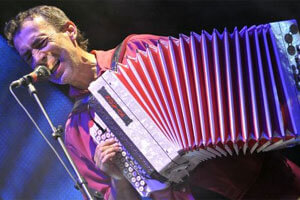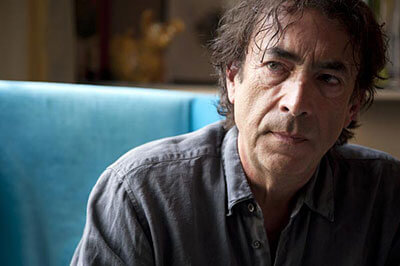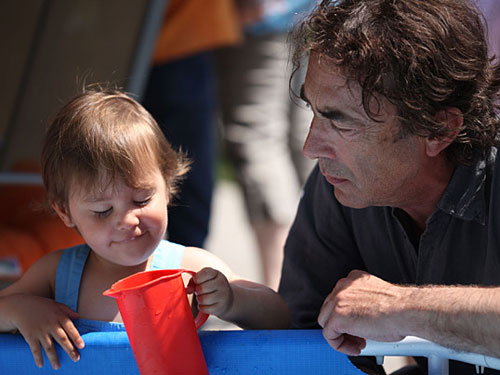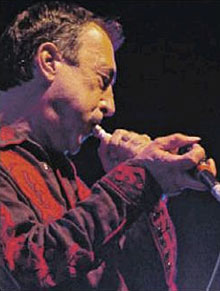TOUR 2011
"Wood and lots of green are my thing"
"Hiatamadl" made him famous and now the the alpine rock movement is impossible to imagine without the 58 year old Salzburger. Ahead of his festival in Kaltenberg the musician talked to Hallo Weekend about his meeting with the Dalai Lama, his wish for more continuity and his relationship with money.
 What is the appeal of the two day festival in Kaltenberg?
What is the appeal of the two day festival in Kaltenberg?
We're trying to bring the spirit of our Linz Europe Tour with the converted cargo ship and the finale concert in Linz to the stage in Kaltenberg. Each of the participating bands was in Linz with us and will be playing their own little concert. But I hope to be able to play together with as many of them as possible again.
What particularly positive memories do you have from your ship tour?
I was under such pressure at the time that I can barely remember. I only slept about four or five house a night in this time. Only when friends make me watch the DVD with them again do I notice how great and exciting it actually all was.
Can fans look forward to hearing old hits in Kaltenberg?
We will of course play a lot from the time between 1988 and 2008. And that's even though we have almost halved the band in comparison to then. Yet interestingly the pieces in which a keyboard was used also work wonderfully with bass, guitar and drums. On the other hand we will also naturally be playing lots of pieces from the new CD in Kaltenberg, which will be released on 2nd September.
There's the new album in 2011, in 2012 comes the big tour. Will you be taking a break again after that?
I don't plan that far ahead. But I notice that I'm changing a bit in this regard. Previously I've always buckled down for four years and then taken a complete break. Now I want there to be more continuity. Of course, whether or not that happens is another question.
You split from the Alpinkatzen at the high point of your success, you take long breaks, put the earnings of a whole tour into the Linz Europe Tour. You don't seem to care much for money ...
You can't buy a life with money. I enjoy the here and now, I don't give a lot of though to money and fortunately don't have to either. But I have lived from hand to mouth before and and there were a few times where that wasn't enough I had to fast. But that was never a problem for me.
In 1996 you had an audience with the Dalai Lama. Were you nervous?
Not nervous, I was really looking forward to the conversation. I have met him many times now, sometimes spending the day with him. I like his charisma, which you can't get down.
Has he also listened to your music?
Yes. He even had to give his personal blessing to a song from the Inexil CD, because otherwise nobody would have dared do it. I used extracts from texts written by the 6th Dalai Lama, who wrote that being together with a woman is more important to him than any meditation. The Dalai Lama swallowed at this of course, but in the end did not complain.
For what do you make time?
I like to fish, read a lot of nonfiction books and I like being in my workshop. I design chairs, benches or a sauna and then build them according to my own sketches. Wood is just my thing.
What do you think of Munich? Is the city your thing too?
I'm getting to appreciate and love the city more and more. I'm not an urban person, I need green. But Munich is very charming, has a nice attitude towards life and a lot of green too. I like being here.
Do you have a favourite place in Munich?
No, but I absolutely must go and look at the new railway station on Münchner Freiheit. I'm a fan of the colour and light designer Ingo Maurer. I like when people can be enchanted, when you forget that you're actually waiting for a train. I can imagine working with colour and light too.
Hubert von Goisern in Nahaufnahme
 The dialect rocker and founder of alpine rock: Hubert von Goisern has many names. The musician from Bad Goisern is releasing his twelfth album and explains in Nahaufnahme, that he needs the city to be creative.
The dialect rocker and founder of alpine rock: Hubert von Goisern has many names. The musician from Bad Goisern is releasing his twelfth album and explains in Nahaufnahme, that he needs the city to be creative.
"The main thread in my life is me"
He doesn't get on so well with the many names and titles that are given to him. "The main thread in my life is me. And I have a name." So says Hubert von Goisern in Nahaufnahme with Judith Weissenböck.
He is currently on tour, in Germany in particular. There are just two concert dates in Austria, 10th July in Grafenegg and 14th July in Bad Ischl. His new album entwederundoder is will be released on 2nd September.
Each concert is unique for him: "I'm very nervous before each show. It hasn't got any better, on the contrary it's got worse. I have it down now that I'm very thin-skinned for just the last 20, 30 minutes. In this time I don't want anyone to talk to me apart from the musicians and technicians."
"It's panicked thoughts that everything that go wrong. Everything has happened to me, from snapped strings and exploding amplifiers to forgetting the lyrics. It's basically the fear of making a fool of myself. The memory that I've coped with all of it helps."
"I need an urban environment in order to be creative"
Von Goisern doesn't want to say anything about his new album: "Talking about music is like dancing architecture, Leonard Bernstein once said. You have to hear it."
He doesn't write his songs among nature: "It is the case that nothing comes to me among nature. But I don't want anything to do so. When I'm out in the natural world, in the mountains, everything is perfect for me. I don't have the feeling that I need to add something."
"I need an urban environment in order to be creative. Everything is man-made in the city, that's where I get the sense that I should make something too, an acoustic graffiti that everyone can hear."
"Ripping up folk music is like an exorcism"
On Sunday evening Hubert von Goisern is giving a benefit concert in Grafenegg
On children in Africa, demands from the FPÖ and minefields from the Nazi era
 How should one address you? Mr von Goisern?
How should one address you? Mr von Goisern?
Just say Hubert. That's what I prefer.
Tomorrow evening you're giving a benefit concert in aid of SOS Children's Village in Africa.
Yes, I had thought about giving this benefit concert for a long time. I know a few children's villages in Austria and Africa personally and I think the people who run them and get involved with them are just great. Helping little mortals and providing for them, making sure that they experience a little harmony and love - it's like helping a flower to bloom.
What was your time of blooming like?
I had a wonderful childhood. It is a gift and I say that consciously, because I'm still drawing from it. When children grow up among pain, need and hate it as good as always continues into the next generation. It is important to help those children who have fallen into disadvantage and darkness in life. And I think the darkness in Africa is somewhat larger and darker than here at home.
How well do you know Africa?
I have spent a lot of time on this continent, in particular in South Africa during apartheid. But Africa is so huge and diverse that I wouldn't want to call myself an expert.
You have also made many appearances in Africa.
I've played two tour in West Africa. That was in Burkina Faso, Mali, Senegal and on Cape Verde. We gave proper concerts, in concert halls and open air arenas, but the greatest ones were always the village parties.
Did they sing along?
Yes! Word always got around very quickly that my friends and I were musicians. And so people made their way to the village square and started playing music and dancing. That's music at eye level. I love it!
How does your music go down in West Africa?
I played and sang our folk music in particular in Africa, yodels and dances. That goes down well! Music has a very different status in these countries than here. Music isn't high culture there, but rather a kind of article of daily use. The line between musician and audience is blurred. You play and sing and all around it's gone straight to people's hips, they start moving and singing their gstanzls over our country dances and Steirers ...
We have "Schunkeln" over here.
People dance, not schunkel at my concerts. Thank God!
The FPÖ wants to force more folk music onto television by law. What do you think of that?
Like so much of what the FPÖ says, this demand is too short-sighted. But yes, it would be great if more Austrian composers and musicians were to appear in broadcasting. There's a deficit. And it's not down to quality. It's the ORF's programming schedule.
How did you come to folk music?
The trigger was six months in a mountain village in the Philippines, far from Manila. I experienced folk music in a completely new way over there. When I returned to Austria and set off in search of our own musical roots I came across a taboo. Getting involved with folk music was like crossing a minefield. Mines from the Nazi era. And then there were phenomena like Musikantenstadl! In order to get folk music out of this quagmire again, I had to rip it up.
What does rip it up mean?
I deconstructed the music. I ripped it up into its component parts. Then I played the accordion like that and I still play it like that sometimes nowadays. It's something like an exorcism.
Heast as net is still your most regularly played song after 15 years. Doesn't it get annoying?
Not at all. I still play it at almost every concert. It's a really cool song. Nowadays I even like it when people sing along.
What comes first: lyrics or music?
Composing comes first. It's seldom the other way around. In exceptional cases they fall into my lap at the same time.
Which is more difficult?
I find it easier to express myself with music. Everything has a pulse, a breath, a sound: passion, joy, desire, sadness, anger ... composing makes it all audible. Writing lyrics afterwards - that's a devil of a thing. I already have the melody in my head and I know what I want to say and then comes the search for the right syllables for each individual note. At first it's like empty space.
Where do you compose, write your lyrics?
I compose at home. My studio is concreted to be soundproof. I can perform as loudly as I want and you hear nothing of it in the house. To write lyrics though, I have to hide away in my house in Goisern. I need the seclusion, the complete introspection.
Tomorrow evening is your show at the Wolkenturm. Will we hear Heast as net?
The odds are good. The song's only 20 years old.
Creativity flows in songs and gardens
Hubert von Goisern will be giving a concert at the Zeltspektakel in July. On his forthcoming album "Entweder und Oder" the star of alpine world music has prescribed himself a degree of reduction. He remembers Remstal fondly.
Winterbach. Hubert von Goisern (58) looked for the quintessence of foreign cultures in Africa and Tibet, rediscovered the traditional sounds of his homeland in the Salzkammergut and travelled the Danube to the Ukraine with a concert ship of sound. Now he's back again: His new album Entweder und Oder won't be released until the beginning of September, but the fresh songs will already be part of the programme when the star of alpine pop guests at the Zeltspektakel in Winterbach on 25th July.
Hubert von Goisern, when you've taken on a huge project like your Danube tour over the course of three summers, how do you motivate yourself afterwards to do something comparatively conventional like simply making a new album?
That's the crucial question. After this huge thing on the Danube I asked myself what could be done now. The Danube tour was indeed Mount Everest for me, so reduction was logical afterwards - away from the widescreen Cinemascope and the really epic titles of my last record S'Nix, to the small songs, which if necessary I can play alone on a guitar. This reduction was the exciting task for me.
After climbing your Danube Mount Everest, did you actually ever think of stopping with music all together?
Sure, but I think about that after the end of every chapter. But then I sat down alone with the guitar and accordion in a hut in my hometown of Bad Goisern and really wanted to write songs that I can perform alone. Songs for which I - if it comes to it - need nobody else. Then the energy of the band - which is just drums, bass and guitar, came later.
You are known as a great cultural seeker, who has worked intensively with traditional sounds in Africa, Asia and at home in the Salzkammergut. How does a very successful pop album without any great world music connection line up beside this?
During the production of my last album S'Nix I had the feeling that I had freed myself from wondering whether it was alpine or world music. Now I've made a kind of singer-songwriter album, reduced to the stories that are told.
Do you write songs when you're so inspired, or en masse, specifically for the production of an album?
The latter is right. I have the feeling that I could write a song at any time, but I just don't do it.
You don't worry that you or your audience thereby miss things?
No, I make occasional notes, on a napkin for example. But then that is only a kernel on which the musical flesh must grown. On the other hand, when I have a creative day, I don't necessarily feel the need to put it into a song. I'm also happy translating my creativity by making the garden look how I imagine. Or I cook something. I don't have the sense that everything has to become music. The main thing is that something comes of it.
Does that mean by implication that it is no longer important for you for thousands to experience your creativity?
No, but it has a great significance for my circle of friends. And I don't want to set my audience and my friends up against each other and think that something is worth more simply because thousands of people hear it. Picasso once said: "art is 90 per cent transpiration and ten per cent inspiration." I think so too. When I write songs I'm in my own world and am no longer available for other people. When I get myself into it, I really shut the door behind me.
Your new song Halt nit an is about travelling. What does travelling mean to you nowadays?
It is still important to me to gain distance from myself. And that still happens best with travel.
You have campaigned intensively for a long time for compassion for Islam; and you have written songs that deal critically with Catholicism. Where do you stand currently on faith?
I am a person of faith, but I'm not religious. I am Christianly socialised and I can't cast that off any more. Religions give people the opportunity to think beyond the banality of the material. Faith without religion is very difficult. That's why I don't want to belittle religions. But I'll criticise them.
Doesn't faith automatically entail a form of religiosity?
Well, I know for example, that it's good to to physically exert yourself at least three - or better, five - times a week. But I still don't do it. Knowing it isn't enough for me. I need an inducement. That would be given for example if I wanted to climb a mountain in order to look down. That doesn't let me forget the exertion. But moving just for health is too little for me. And religion is similar in that way for me. But I know many religious people, where I get the sense that it's good that they have their religion.
There is one song of farewell and two songs about relationship fights, even though the artist Hubert von Goisern has been in a stable relationship with his wife for years. Where do you get the inspiration for such songs?
Well, I have a stable relationship, but I don't live solely in this relationship. I go through the world and things happen to me outside this stable one-woman relationship. And if songs only really reflect a true story, they are very weak and poor songs. Many things are condensed in my songs. I'm at the end of my fifties and many old not yet processed things and coming to the fore. And many songs spring up simply on a whim of fantasy. Sometimes it is the case that I sing a song and the story doesn't happen until afterwards.
Which stories will we hear from you in the future?
I don't know. I can imagine writing a book of fiction sometime. That might be fun. But I know that I was born to make music and stand on stage. And I regard being given this gift with great respect. I can also imagine teaching music in a few years. Under the motto "How one can enchant people with music - and why one should". But I would only want to teach people who were really interested in it - and not those who are on the course simply because they need to tick something off.
You played at the Zeltspektakel in Winterbach two years ago. Do you remember it?
It was a very cool concert with a great atmosphere. I usually don't like tents so much, because the sound is very difficult. But I have no negative memories of Winterbach in that regard. And I remember well the opportunity swimming. It's probably the river that runs behind. It was a very hot day and the swimming was really good. I'm very much looking forward to the concert.
Hubert von Goisern sings for SOS Children's Village
Musician and songwriter Hubert von Goisern will be giving a benefit concert at the Schloss Grafenegg Wolkenturm (Lower Austria) on 10th July, the proceeds of which are to go to the SOS Children's Village Fort Portal in Uganda.
The desire is to "fill every last seat in order to be able to do a great deal of good in Africa" Heinz Nußbaumer, President of SOS Children's Village Lower Austria, said on Thursday at a press conference with the artist in Hinterbrühl.
Hubert von Goisern himself saw his concert - the first of only two in Austria on his 2011 tour - as humble. His contribution to helping the children in Africa is "small", he said. He feels close to the continent and its people. The 58-year-old Austrian remarked that nowhere else can children be seen "so at the mercy of others and helpless and yet so full of life and cheerful". The benefit concert is an attempt "to drum up interest and win hearts".
If nothing else, Hubert von Goisern is looking forward to "being able to try out the legendary acoustics in Grafenegg".
The idea for the concert arose about eighteen months ago, said Nußbaumer. The date now coincides with the 40th anniversary of SOS Children's Villages in Africa. Hubert von Goisern is "the only living Austria world musician who repeatedly bridges continents, generations and different cultures with his songs and compositions". Nußbaumer said that the Vice Chancellor Foreign Minister Michael Spindelegger would be among the guests expected at Grafenegg.
What will be the fourth SOS Children's Village in Uganda will be opened in Fort Portal on the 23rd June. This has been made possibly entirely through Austrian donations. The establishment will also be home to a kindergarten, which will profit from the net proceeds of the concert in Grafenegg.

The audience won't be scared
Alongside his first regular concerts after an eighteen month live break Hubert von Goisern will also be playing in taverns in April. Many of the shows - today, it all kicks off in Neuhofen im Innkreis - are sold out.
 According to which criteria were the taverns chosen?
According to which criteria were the taverns chosen?
The atmosphere and history were important to me. They shouldn't be a new building, nor a chic event centre. The taverns also had to be outside conurbations - and the landlord had to be nice too.
You usually play in front of a few thousand people. Where does the challenge lie in appearing in such a small hall?
It's no "back to the roots". I've never done anything like this, played in taverns, I mean. Well, once in Bad Goisern in 1992. What drives me is the curiosity, the question: is there a difference between Vylkove and Rauris? Between Donji Milanovac and Neuhofen im Innkreis?
How does the setting affect the playing?
As far as playing is concerned I don't see any difference - but everything is much closer, more direct. It's more at eye level and that's the attraction.
You're also playing a "proper" tour in Germany in April - though without a new album. Why is that?
We've already recorded the new album. There are a couple of additions to make after the April tour and the album will be mixed in May. The release date is then the end of August.
Why didn't you want to wait?
It's just the way it turned out. I wanted to go on the road in the spring and the songs were there - and I had no desire to wait until the post production, the cover design and all that was finished. Aside from that, it's more exciting if the audience doesn't know what to expect.
Are you not worried about scaring your audience?
I've never had the impression that my audience is easily scared. I think that the audience is more curious than most would like to believe and are happy to be surprised. I would even go so far as to say that it waits for the unexpected.
